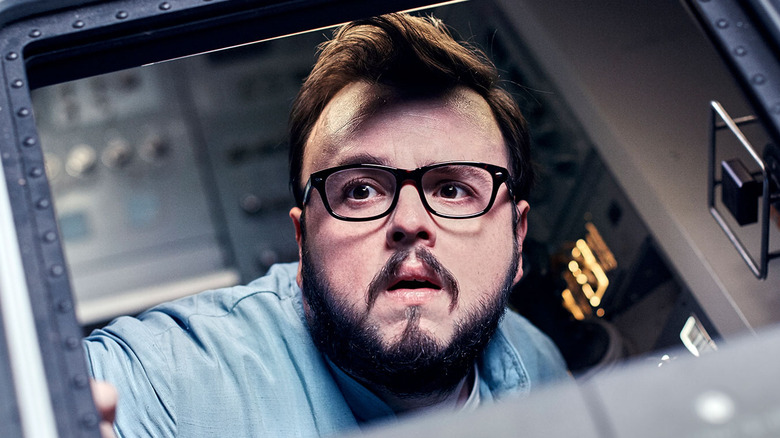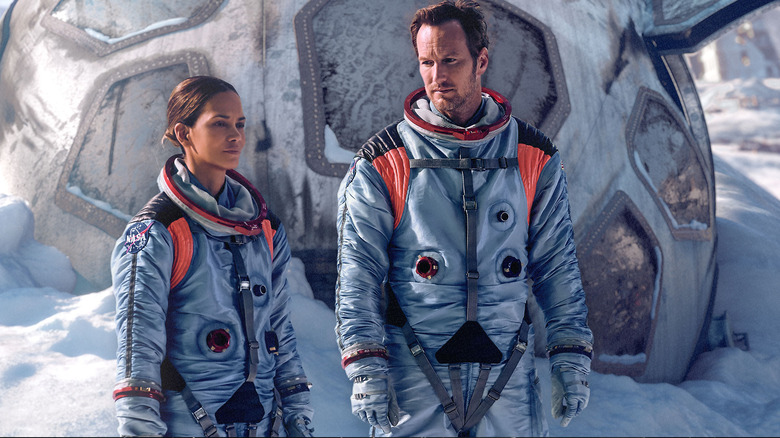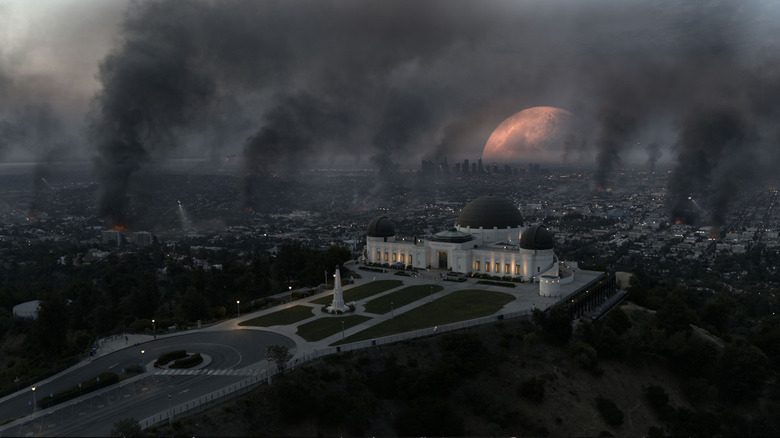Moonfall Review: Bad Moon Rising
Disaster picture auteur Roland Emmerich recently became the latest in a long line of filmmakers talking smack about the proliferation of the Marvel Cinematic Universe while promoting a new film, but it's a bit of a shame "Moonfall" is the movie he's promoting while sharing this sentiment. Not just because the film's absurd premise and near-certainty of negative critical reaction can be used as ammo from the fandom to pretend his remarks have no validity, but because this particular film — on the surface anyway — feels like a crystalline indictment of how his output hasn't been much better for the health of cinema.
Like the vast majority of Emmerich's oeuvre, "Moonfall" is an enormous disaster movie about a cataclysmic event told against the backdrop of an ensemble cast's varied domestic conflicts. The ideal Emmerich joint features a sprawling group of character actors, each struggling with divorces, estrangement from children, and professional disillusionment that can be temporarily set aside while they, and the rest of humanity, pull together to team up against some outside force. In "Independence Day" it was an alien invasion. "The Day After Tomorrow" was extreme climate change. "Moonfall" is literally the moon itself falling out of orbit and hurtling closer to the Earth.
If that sounds like an overly simple near-parody of what an audience should expect from an Emmerich picture, that's because "Moonfall" feels, even at its best, like a poor echo of what has worked before, with very little of the nuance and character that elevated Emmerich's best work from feeling like more than '90s retreads of '70s disaster cash-ins. It's a laughable concept for a movie, lacking the star power and scale to really sell its absurdity as more than a joke. But for all its middling dialogue, hackneyed structure, and uninspired dramatic beats, "Moonfall" still concludes with a rollicking third act that's almost entertaining enough to make up for all that's come before it.
Almost.
Do you want the bad news first?
"Moonfall" principally concerns three leads, each with chips on their shoulder regarding the vastness of space. There's former best friends Jo (Halle Berry) and Brian (Patrick Wilson), who worked together at NASA ten years ago before an encounter on a routine mission with what can best be described as a unidentified malevolent force took the lives of their colleagues and ravaged their friendship, along with Bryan's career. Bryan saw something outlandish out there, but Jo was incapacitated at the time, and wouldn't back him up when others insisted the catastrophe was little more than man-made error. A decade later, Jo is a high-ranking NASA official with a divorce under her belt, and Bryan is a drunk nobody with a divorce under his belt and a son who doesn't respect him (Charlie Plummer.)
But the film's real hero is K.C. (John Bradley), a crackpot conspiracy theorist who is the first to discover that the moon's orbital trajectory is out of whack. He's also a "megastructurist," someone who believes the moon — really all moons — is a hollow vessel created by advanced human life. Together this unlikely trio has to figure out how to stop the moon from circling closer and closer to Earth and prevent all the extravagant, apocalyptic side effects of such a horrifying anomaly.
What this means is that for the film's first act, it awkwardly mirrors a less funny version of "Don't Look Up." with the government trying to ignore what's going on before inevitably moving to, you know, nuke the moon. While the intrigue surrounding what is going on with the moon is fun enough, and the mystery about the mysterious swarms of black nanites emanating from one of its craters proves genuinely compelling, all the film's human drama feels bland and hard to care about. Wilson and Berry do their best to make up for underwritten characters, while Bradley tries his hardest to make up for the tragedy of not being Simon Pegg. But the cast is skint compared to the outsized ensembles a good disaster picture needs to function.
Ideally each of the B-plots and supporting players are diverse and rely on a variety of interesting character actors to make up for the storytelling efficiency needed to drive one of these movies forward. But here, Wilson and Berry's arcs are too similar, and there aren't really any notable background characters to speak of, other than Michael Peña as Bryan's ex-wife's new husband and Kelly Yu as a foreign exchange student. But where the film's main plot fails, outside of its threadbare characterization, is in its pacing.
"Independence Day," arguably Emmerich's best work, runs close to 2.5 hours, while this one runs just over two. Normally, a leaner picture could be a good thing, but "Moonfall" moves a little too quickly at times, awkwardly stitching exposition to unfunny comic relief with no room for the emotional beats to breathe or for the escalation of the global carnage to land. It's a big movie that nonetheless feels smaller than its $140 million budget by virtue of not effectively showing the world at its proper scale. The entire purpose of seeing a movie this "epic" is to showcase the grandeur of the big screen, and while its larger moments definitely warrant the theatrical experience, its more intimate moments feel too much like television.
Throughout its runtime, "Moonfall" just feels like a pale imitation of something Emmerich might have made 20 years ago. But luckily, it has just enough magic in it to keep from feeling like a waste of time.
The dark side of the moon
For the lucky moviegoer capable of getting through all the middling work in the film's first and second acts, forced to subsist on little more than the excitement of seeing shots of the moon looming on the horizon with clear menace and the resilient charm of Patrick Wilson, there's a real treat waiting in the film's finale.
Once the core characters actually make it out into space to attack this whole falling moon problem head on, the panache for action that has seemingly eluded Emmerich the whole movie returns, and "Moonfall" comes alive. Sure, it's still ridiculous, but it's ridiculous in a thrilling way that allows audiences to suspend their disbelief and ride on the charm of its visuals and the grandiosity of its ideas. When the curtain is finally pulled back and we finally get the answer to the "what's inside the moon?" question the marketing has so smartly centered around, it's genuinely laughable that Emmerich and his co-writers burned this much science fiction energy on the twist to a disaster movie when any number of streamers would gladly have paid handsomely to spin this into an ongoing series with four or five seasons. It feels like the equivalent of rigging an electric toy car to a V8 engine just to see how fast it can race around the cul-de-sac.
But it allows for the movie to pay off a lot of potential that, up until Patrick Wilson is dogfighting intelligent swarms of nanobots inside the moon's core, "Moonfall" didn't seem capable of delivering. It even allows for the conclusion's heavily telegraphed and well-placed tragedy to resonate emotionally, even though up to this point, none of the characters seemed well drawn enough for any sort of sacrifice to have real meaning.
As dumb and shoddily written a picture as "Moonfall" is, Emmerich and his collaborators are able to stuff just enough genuine and stirring majesty into its climax that the endlessly renewable resource of "movie magic" gets everyone across the finish line, operating on the sheer inertia of the average person's love for seeing explosions in space.
"Moonfall" is not particularly memorable and the light teasing of its final scene is unlikely to yield any sequels, but it's more fun than it ought to be, has just enough heart to make a grown man weep, and is only marginally more stupid than it appears in ads. That may just be the kind of win the omicron box office needs.


